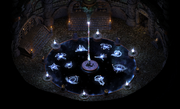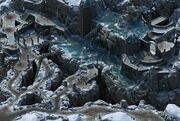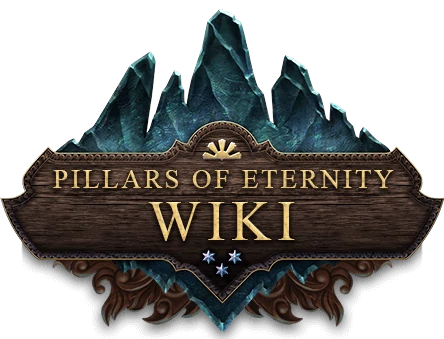The Deities are entities widely recognized and worshipped across Eora.
Priests choose a deity during Character Creation.
Background[ | ]
The gods are a group of 11 entities. They exist in a realm known as The Beyond. While they have made a mutual agreement not to interfere with kith civilizations directly, they left themselves a convenient route to renege on this agreement, if they deemed that they had no recourse but to intervene.[1]
Pantheon[ | ]
- Abydon: God of crafting and the forge, and patron of the Knights of the Crucible.
- Berath: God of cycles, doors and death.
- Eothas: God of light and redemption.
- Galawain: God of the hunt in all its forms.
- Hylea: Goddess of birds and the sky.[2]
- Magran: Goddess of fire and war.
- Ondra: Goddess of water and the moon.[3][4]
- Rymrgand: God of death, famine, plague, or simple bad luck.
- Skaen: God of secret hatred, resentment, and violent rebellion.
- Wael: God of dreams, secrets, mysteries, and revelations.
- Woedica: Goddess of law, memory, rightful rulership and vengeance.[5]
Worship[ | ]

Communing with the gods in Teir Evron.
People may worship more than one god, but they tend to honor those who are most associated with their way of life. Farmers often worship the gods of light, growth, or storms, while warriors might praise the gods of battle or fortune. For some, this worship is a matter of respect and tradition; they believe their deities to be their creators, and disrespecting them could bring dire consequences. For others, worship is a matter of karmic self-interest. Such individuals hope that their deity will favor them and place their reincarnated soul in the body of someone who will live a good life. For them, choosing not to worship is to risk spiritual confusion, aimlessness in the Beyond, or a place in the lottery of souls, which could result in their next life being worse than their current one. Beyond their primary deities, most people will say a prayer to the appropriate god when the circumstances are right. Farmers will pray to the god of battle when their lands are invaded, and warriors will pray to the god of the hunt when they're starving in the wilderness.
Sometimes, the same god has distinct identities in different parts of the world. For example the god of life and death is called Berath in Aedyran, Cirono in Vailian or Rikuhu in Huana.[6]
Origin[ | ]
The gods of Eora are not gods in the traditional sense. Rather, they are the artificial creation of Engwith, an ancient society of high minds and broad concerns. In the time of the Engwithans, every civilization worshipped its own gods, which inevitably led to religious warfare. After a series of devastating conflicts, the Engwithans sought an end to it. They devoted all their energy to finding the true Creators. Generation after generation, they analyzed the fabric of the world and unlocked its secrets, mastering the science of the soul and all metaphysical concepts, including taming the Wheel. One day, they found an answer... except the answer was no answer at all. There were no gods to be found, or if there ever were, they were gone. It was a terrible shock to them; if they could discover this on their own, how long until others would? How long before war and chaos reigned over a world without consequence? To prevent this scenario, they used their mastery of the soul to create their own gods to fill the void.[7]
Using a massive adra-powered machine at Sun in Shadow, they extracted the essence of thousands of Engwithans assembled in the chamber - men and women, children and the elderly, all they could find - to empower themselves and become the gods of Eora. Each deity was crafted from an ideal, to give kith not one, but many meanings to choose from in life.[8][9] They incorporated aspects of gods from existing legends.[10] The exceptions of this process was Skaen, who was a "receptacle" for troublemakers,[11] and Rymrgand, who contains some ancient aspects.
The surviving Engwithans then sent missionaries to the corners of the world to spread their faith. The missionaries knew the secret of their gods' creation, but never revealed it to anyone. They refrained from marrying, voluntarily extinguishing their bloodlines to minimize the risk of exposure.
Iovara ix Ensios[ | ]
The entire endeavor was almost ruined when Iovara ix Ensios learned the truth, by accident, from careless missionaries discussing the subject openly at one of their temples.[12] Her defiance and determination to expose the gods as fraudulent eventually coalesced into a popular movement that only grew bolder as the Inquisition formed and retaliated against Iovara and her followers, many of whom were former missionaries. The rebellion threatened to destroy the fledgling faith until Thaos ix Arkannon, one of the authors of the divine project, captured Iovara at a city called Ossionus in circa 800 AI. He brought her to the Court of Penitents and tortured her to death, then imprisoned her soul in the adra cells below. She would languish in the prison, preserved only by her extraordinary will, for the next two thousand years, until the Watcher found her in 2823 AI.[13]
Belief in the gods of Engwith spread throughout the world, eventually becoming the one true faith of all kith. Their true nature would be successfully obfuscated by Thaos and his Leaden Key and Wael's Hand Occult.
Titans[ | ]

The skeletal bodies of the titans in the lower left. They ring the machine responsible for directing The Wheel at Ukaizo.

The skeleton of Abydon's titan visible at the abbey.

A portion of Wael's titan, if awakened in The Forgotten Sanctum.
Prior to finishing the machines at Ukaizo that tamed The Wheel, the Engwithans created great artificial bodies of flesh and bone known as titans.[14] The process required an item called a godseed, one of which was discovered in 2828 AI by The Watcher.[15] The massive titans were the physical bodies of the gods and walked Eora in the early days of their godhood.[16][17]
The machine that took control of the Wheel was fitted with eleven alcoves for the gods to abandon their titans if they so chose. Eventually, the gods decided to abandon them, after a pivotal event involving Ondra and Abydon in his titan form.[18] However, only eight gods ultimately abandoned their titans at Ukaize, and three alcoved were left empty.[19]
Abydon's titan[ | ]
Ondra decided it was necessary to hide the gods secrets by destroying the Eastern Reach and the Deadfire Archipelago.[20]
To destroy the Eastern Reach, Ondra "called down" one of Eora's moons, Ionni Brathr.[21] Although the other gods did not oppose Ondra, Abydon, being devoted to progress, industry and preservation, disagreed with this decision.[22]
He forged a mighty hammer that he used to shatter the moon before impact. However, it was not enough to destroy all fragments. In a last attempt to stop the destruction, he absorbed the impact from the largest fragment, which destroyed his titan body and left Abydon himself damaged.[21] Ondra grieved the death, as she loved him. The body has become part of The Abbey of the Fallen Moon.
In the aftermath of the event the gods agreed to abandon their titan bodies. They left them to decay at Mói Gweath in Ukaizo.[18]
Wael's titan[ | ]
Members of The Circle of Archmagi, aided by The Watcher, discovered Wael's sleeping titan body buried beneath The Black Isles. The Hand Occult occupy the Temple of Revelation atop the body.[23]
The Watcher learned that Wael had simply hid the body from themselves and forgotten it.[24]
Exile of Woedica[ | ]
According to her followers, Woedica had once claimed rulership over all the other gods.[25] But, she was cast down in the far distant past. Her crown is depicted as being broken.[26] Among the other gods, she has no real allies, believing that all the gods owe her fealty.[5] However, as the god of resentment and violent rebellion, Skaen sometimes supports her.
Waidwen's Legacy[ | ]
In a bid to re-empower Woedica, Thaos ix Arkannon restarted several ancient Engwithan machines in The Dyrwood around 2809 AI.[27] The machines diverted the souls intended for new births, causing a crisis of hollowborn children. In 2823 AI, The Watcher killed Thaos and ended the crisis.
Eothas' death and return[ | ]
Eothas, who contains aspects of both death and rebirth, is said to love kith the most.[11][28] He came to the conclusion that the gods needed to step aside to allow kith to succeed (or not) on their own and to expose the gods true nature. He decided he needed to "break the foundations of belief itself, to extinguish the lights that maintain the illusions we have created".[10]
The Saint's War[ | ]

Waidwen leading the Eothasian forces across the bridge into Dyrwood, a split second before the Godhammer exploded.
To expose the truth of the gods origin, Eothas entered the body of a willing farmer from Readceras named Waidwen.[10] Waidwen gained a following and was quickly named the "Divine King" ruler of Readceras. In 2807 AI, Readceras invaded The Dyrwood.[29]
Afraid of what Eothas would do, Magran (after being goaded by Woedica) assisted a group of Magranite priests from Ashfall in creating the Godhammer Bomb. The bomb was used against Waidwen at Halgot Citadel after luring the Readceran unit across the bridge.[30] The explosion destroyed Waidwen and Eothas, although the body was never found.[31]
Return[ | ]
In 2828 AI, Eothas summoned enough strength to take control of the statue of Maros Nua (located below Caed Nua) in The Dyrwood. The event caused great destruction in the area, killing over 300 people and nearly killing The Watcher.[32]
Eothas then marched across the ocean to the Deadfire Archipelago. Although some of the other gods tried to stop him[33], he eventually made his way to the lost city of Ukaizo and successfully destroyed the great machine the Engwithans had built to control the flow of the Wheel.[34] In breaking the cycle of rebirth, he believed "it will force all of us to face the truth. We will fail together or move forward together. Either ending is preferable to the cycle we still find ourselves in."[10]
References
- ↑ Ondra says at the Abbey of the Fallen Moon: "We agreed long ago, all of us, not to alter the course of kith civilization. Not directly. Not unless there was no other choice"
- ↑ Obsidian forum post by Josh Sawyer: "...Hylea, who is a goddess of birds and the sky."
- ↑ Something Awful post by Josh Sawyer: "godlike who exhibit physical properties associating them with the moon and water, which are both aspects of Ondra"
- ↑ Forum post by Josh Sawyer
- ↑ 5.0 5.1 Update #40 with George Ziets: "She claims the portfolios of law, rightful rulership, memory, and vengeance."
- ↑ Update #24 with Josh Sawyer
- ↑ Iovara: "They were conceived by Engwith, a society of high minds and broad concerns. Thaos' people. In their time, every people worshiped its own gods. Sometimes they warred over it. After a few wars of their own, the Engwithans sought an end to it. They devoted all their energy to finding the true Creators. Generation after generation, they prodded and worked the stitching of the world and unlocked its secrets. One day they found an answer - except the answer was no answer at all. There were no gods to be found. Or if there ever were, they were gone. It shook them, this finding. If they could discover this on their own, how long until others would? How long before war and chaos reigned over a world without consequence? But they had mastered many things in their pursuit of these answers. And with their mastery they crafted their own gods to fill the void, and sent missionaries to the corners of the world to spread their faith."
- ↑ Thaos
- ↑ Sun in Shadow memory.
- ↑ 10.0 10.1 10.2 10.3 Eothas at Magran's Teeth in POE2: "I want to return the gods to our original purpose. And to allow mortals to worship us - or ignore us - for what we are, not what we pretend to be." and "We began with a dream that if we provided guidance to mortals, each generation of souls would grow stronger. And if the souls grew stronger, societies would become better, moving ever closer to achieving the potential we believed all mortals have within them."' and "Over two thousand years have passed. Hundreds of generations have been born, lived, and died. If the world has improved under our guidance, mortals should be prepared to understand the truth." and "The time has come for a new covenant between gods and mortals, one forged in the light of truth and understanding between our kind." and "We took on the mantles of gods from legends, and in so doing, made real what was false, crafted truth from fiction." and "When I entered Waidwen, I did so with the intention of illuminating the history of Engwith. I wanted to show all the nations of the Eastern Reach the machines we had used to create ourselves, how we had hidden our true nature from mortals for millennia." and "When I reach that place, I will find our great machines and tear them to pieces. I will smash the Great Wheel until the lights of Hel all gutter and die. Both gods and mortals alike rely on the Wheel. We depend on it for the souls that give us power. Mortals depend on it for the lives of future generations. Breaking it will force all of us to face the truth. We will fail together or move forward together."
- ↑ 11.0 11.1 Burned Book of Law
- ↑ Iovara: ""The Engwithan missionaries all knew it, but they never told the rest of us. They meant it to be a secret that died with them, and in the end they allowed their bloodlines to fade from memory. I had been assigned to join a few of them at a temple. I found the door to their chambers closed, but the room was stone and the door thin. Their voices carried. I heard... enough. I investigated the things they spoke of, and everything was there, just as they said it'd be.""
- ↑ Iovara during Memories of the Ancients.
- ↑ The guardian of Ukaizo: "When the machines were nearly done, the outsiders constructed bodies of flesh and bone. Skeletons now, their remains littering great Ukaizo."
- ↑ The Seeds of Deception
- ↑ Storm Speaker Ikawha on Eothas: "Yes, one of the old titans, say the priests."
- ↑ Magran in POE2: "In the age when our steps carved valleys across the face of Eora, our bodies were impervious to all but the strongest attacks."
- ↑ 18.0 18.1 Ondra to Woedica in POE2: "We set them aside after I killed Abydon, it is true, but you did not fight the decision then."
- ↑ Mói Gweath description from POE2: "Cresting the top of a fallen tower, you finally get a clear view of Eothas. He stands, legs astride, next to a great stone monument ringed with eleven cavernous alcoves. All but three hold a gargantuan skeleton, bones scrubbed clean by the city's storms."
- ↑ Ondra on why they did this at the Abbey: "There was a time when we let our sympathies get the better of us. When memories were allowed to persist that should have been washed away." and "Civilizations are meant to ebb and flow. Allow them to persist for too long in power or knowledge and you invite catastrophe." and "To erase all knowledge of such a grand thing required unthinkable devastation. The Eastern Reach. Deadfire. Mine was the only solution."
- ↑ 21.0 21.1 Ondra at the Abbey: "I called the moon down to me. Ionni Brathr. It was... against his wishes. He would not listen to reason. Would not listen to me. In his madness, he splintered the moon, but it was not enough. The greatest of the fragments still fell toward that which he would protect. In the end, he took position where it would fall, and absorbed the impact himself."
- ↑ Ondra says this about Abydon at the Abbey: "He was devoted to progress and industry from the beginning. But so, too, was he devoted to preservation."
- ↑ Annotated History
- ↑ The Inner Mysteries
- ↑ The Queen That Was - And Still Is
- ↑ Crown of the Exiled Queen
- ↑ Timeline
- ↑ Magran after Magran's teeth in POE2: "Eothas loves the mortals more than any of us. He has always been their greatest champion. He believes kith will rise to his challenge. I am not so sure, but I look forward to watching them try."
- ↑ Timeline
- ↑ Durance
- ↑ Edér Teylecg
- ↑ The Grasp
- ↑ He Waits in Fire
- ↑ The City Lost to Time
| |||||||||||||||||||||||||||||||||||||||||||||||

